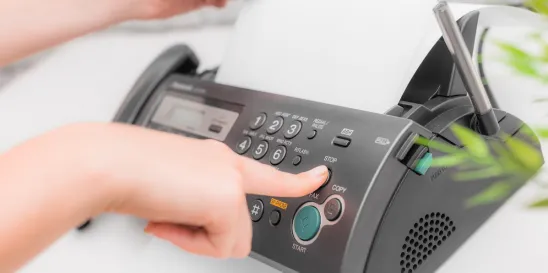Happy Friday TCPAWorld!
Sharing with you an interesting case about Faxes!
In this case, the Court explains what is considered a fax for the purposes of the TCPA and more importantly, what is not! Because deciding whether a class recipient received a “fax” would lead to an individualized inquiry, the Court denied class certification but awarded Plaintiff summary judgment on its individual TCPA claim.
Before the Fourth Circuit Court of Appeals is Career Counseling’s appeal of the denial of class certification and AmeriFactor’s challenge to the award of summary judgment. Career Counseling, Inc., d/b/a Snelling Staffing Services v. Amerifactors Financial Group, LLC., 2024 WL 220377. Unconvinced with counsel’s arguments, the COA affirmed the denial of class certification and the award of summary judgment.
By way of background, Career Counseling alleged that AmeriFactor Financial Group sent an unsolicited advertisement by fax to Plaintiff and thousands of other recipients in violation of the TCPA. Career Counseling ultimately proposed a class comprised of the nearly 59,000 other persons and entities who were successfully sent the same June 2016 fax that Career Counseling received.
The district court determined that Career Counseling complied with the Federal Rule of Civil Procedure 23(a)’s prerequisites of numerosity, commonality, typicality and adequacy of representation. But it failed to meet the ascertainability requirement.
Under that requirement — which is commonly referred to as “ascertainability” — “[a] class cannot be certified unless a court can readily identify the class members in reference to objective criteria.” So, “if class members are impossible to identify without extensive and individualized fact-finding or ‘mini-trials,’ then a class action is inappropriate.” (alteration and internal quotation marks omitted).
While the record shows that each of the class recipients of the fax was using either a “stand alone fax machine” or an “online fax service,” the district court concluded that the TCPA only prohibits unsolicited advertisements sent to stand-alone fax machines but the TCPA does not reach unsolicited advertisements sent to online fax services. Because the court was not convinced that the stand-alone fax machine users were readily identifiable, it decided that the ascertainability requirement was not satisfied.
The district court found that, under the Administrative Orders Review Act or Hobbs Act, it was bound to the FCC’s Declaratory ruling in AmeriFactors Fin. Grp., LLC. which states that “an online fax service….is not a ‘telephone facsimile machine’ and thus falls outside the scope of the statutory prohibition.” See AmeriFactors Fin. Grp., LLC. 34 F.C.C.R. 11950-51 (2019). The district court further rejected Career Counselings’ method of identifying the stand-alone fax machines users finding that an individualized inquiry of each fax recipient was required.
The COA squarely rejected Career Counseling’s argument to abandon precedent and that the AmeriFactors FCC Ruling cannot be applied retroactively because that decision was released in 2019. The faxes in this matter were received in 2016. Instead, the COA held that the plain statutory language of the TCPA prohibits the sending of unsolicited advertisements to stand-alone fax machines but not to unsolicited advertisements sent to online fax services.
Further, the COA held that the TCPA’s allows a fax to be sent from a computer or some other device but the fax can only be received in one way: a telephone facsimile machine. And an online fax service is a cloud-based service that is used to send or receive documents.
It is clear to us that — whereas a stand-alone fax machine is the quintessential “equipment which has the capacity … to transcribe text or images (or both) from an electronic signal received over a regular telephone line onto paper,” see 47 U.S.C. § 227(a) (3)(B) —
an online fax service is not such equipment and thus cannot be said to qualify as a “telephone facsimile machine” under the TCPA.
That is because an online fax service neither receives an electronic signal “over a regular telephone line” nor has the capacity to transcribe text or images “onto paper.” Rather, online fax services receive faxes over the Internet and cannot themselves print any faxes.
As to Career Counseling’s method of identifying which fax recipient used a stand-alone v. online-fax, the COA affirmed the district court’s decision that Career Counseling failed to present sufficient evidence that the more than 20,000 recipients without online fax services were instead using stand-alone fax machines.
On AmeriFactor’s cross appeal challenge to the summary judgment award, AmeriFactor argues that it is not the “sender” of the fax. Relying on the FCC’s Akin Gump Ruling, AmeriFactor argues that the “fax broadcaster” – another party, AdMax – is the sole “sender” of the fax for purposes of the TCPA. To support this argument, AmeriFactor argued that AdMax made material misrepresentations and AmeriFactor relied on those representations that AdMax was fully compliant with the law.
Unconvinced, the COA found that the district court recognized AmeriFactors’ argument and rejected the evidence as insufficient to create an issue of material fact regarding the false statements. As such, the COA agreed with the district court’s finding that there was insufficient evidence of fraud and deception to put at issue AmeriFactor’s “sender” liability in dispute. Therefore, the summary judgment award was affirmed.
A great win for the Defense! If you are sending faxes, it is important to understand this distinction.




 />i
/>i

